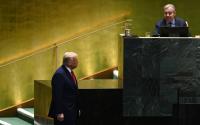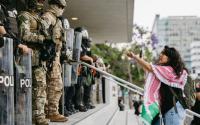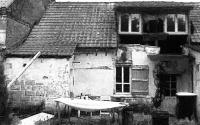George Bush and Tony Blair have apparently concluded that they can crush the Iraqi people's will to resist occupation and legitimise a puppet regime next January by occupying Falluja. Maybe they imagine they can emulate the British forces that terrorised Iraqi Kurdistan in the 1920s by obliterating recalcitrant villages.
The US generals will no doubt deliver Falluja to Bush and Blair after bombarding its neighbourhoods with artillery and rockets. But they are doomed to deliver neither the Fallujans nor the people of Iraq. Perhaps they are unaware that Fallujans defied Saddam's rule during his last years in power. Falluja - known as the city of a thousand mosques - attracted Saddam's wrath in 1998 when its imams refused to hail the tyrant in their Friday sermons. Many were imprisoned, and the city punished as a result.
But the generals certainly do know how resistance began in Falluja. On April 28 2003 US soldiers opened fire on parents and children demonstrating against the continued military occupation of their primary school - killing 18 of them in cold blood and injuring about 60 others. Until the killing of those demonstrators, not a single bullet had been fired at US soldiers in Falluja or any of the cities north of Baghdad. But, remorselessly, little-known Falluja became a world-renowned centre of defiance, where a poor and poorly armed people has courageously faced the military wing of the new empire.
The way Falluja's 300,000 people reacted to the April 28 massacre has made them a prime target for savage bombardment and conquest. Najaf was bombed into a ceasefire in August. Samarra was conquered in September. Sadr City in Baghdad was bombarded and negotiated into temporary silence in October. Now they want to crush the symbol of Falluja, to teach the rest of Iraq a bloody lesson. Another pyrrhic victory is likely to be added to an already long list.
Blair once again misled parliament this week by branding the resistance in Falluja as Zarqawi-style terrorists out to destroy the prospects for democracy. It was he and Bush who last year rejected the calls for early free and fair elections from those who rejected the occupation, including Ayatollah Sistani, Moqtada al-Sadr, the resistance and the widely supported Iraqi National Foundation Congress. Bush and Blair are terrified of the Iraqi people voting for anti-occupation leaders. They will accept nothing short of the legitimisation, through sham elections supervised by the occupation authorities, of an Allawi-style puppet regime.
More than 100,000 Iraqis are estimated to have been been killed since the US-led invasion; the country's infrastructure has all but been destroyed; people are exposed to the danger of US and British depleted-uranium shells; hospitals have been reduced to impotence in the face of mounting injuries and disease; the centre of Najaf and entire neighbourhoods of several cities have been razed. How much more should the Iraqi people be subjected to for Bush and Blair to have their "democratically" chosen puppets installed in Baghdad?
These are war crimes of Saddamist proportions, and there is evidently more to come. Bush's latest pronouncements and Blair's declaration of a "second war" have made clear that the occupation governments are ready to kill (as "collateral damage", no doubt) even more Iraqis to enforce a pro-US order. Without a shred of evidence, Bush, Blair and Ayad Allawi's quisling regime shamelessly declare that they are only pursuing the Jordanian kidnapper Zarqawi and other "foreign terrorists". The people of Falluja, their leaders, negotiators and resistance fighters have always denounced Zarqawi and argued that such gangs have been encouraged to undermine the resistance.
The occupation forces have now reverted to their initial ploy of attacking cities north of Baghdad, while reaching ceasefires with some Baghdad districts and southern cities. Presumably, they see this as an effective divide-and-rule tactic, but it is likely to prove as futile as the rest of their plans for post-invasion Iraq. It is, in reality, merely a battle postponed. Iraq's history, reaffirmed by events since the US-led occupation, shows that its people's unity is stronger than differences based on religion, sect, ethnicity or national identity. That was demonstrated on Sunday when a senior Kurdish officer with the token US-commanded Iraqi force besieging Falluja deserted within half an hour of being shown the plans to occupy the city.
The US and British governments could do worse than digest the old Chinese proverb: "They lift a stone to drop it on their own feet." For they might have occupied Iraq and succeeded in lifting some of its heavy stones, but the stones will inevitably come crashing down on their feet.
· Sami Ramadani was a political refugee from Saddam Hussein's regime and is a senior lecturer at London Metropolitan University
http://www.guardian.co.uk./print/0,3858,5059119-103550,00.html






